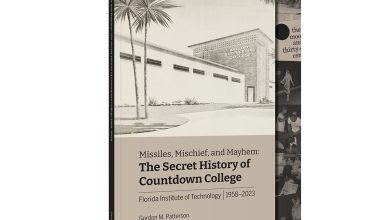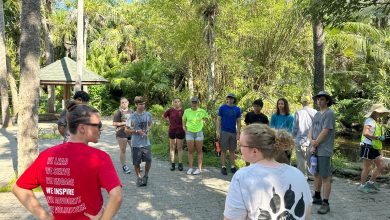Lessons in History
By Kate Broderick, Global Strategic Communication, ‘14
I should preface this story with the disclaimer that I studied humanities with the School of Arts and Communication at Florida Tech as an undergraduate. Clearly, as a student of humanities, I have a passion for history and literature. That’s only part of it. To me, it’s always been about the story. I like to study how these complex threads in history—sometimes so seemingly unrelated—weave together to create an event. Little twists in the tapestry of history that at some point set the world spiraling down a new path.
I’ve had the opportunity to learn this first hand teaching Creative Writing on the weekends at a local independent/assisted living facility.
After participating in the School of Arts and Communication’s Creative Writing Institute for two years, I’ve learned a thing or two about creative writing. I was asked in early May if I would be interested in teaching a creative writing course, and hesitantly accepted the offer. Hesitantly because I have never taught creative writing, and I envisioned myself showing up to a class full of retired professionals irked at the prospect of an uppity whippersnapper impertinently trying to teach them a thing or two.
That was not the case at all.
My class consists of twelve students, ranging from late 60s to mid-90s, and each one of them is sharp as a tack. Two are retired military, one worked at Cape Canaveral and watched from the front lines as the shuttle program blossomed into life. Each has a unique story waiting to be revealed behind their patient eyes.
Occasionally my students will ask me a question like, “Why does everyone keep using the number sign in front of words?” and I have to explain the concept of Twitter and hashtags, but generally my students are the ones that end of teaching me. Over the past few months, my students have revealed little pieces of themselves, of their history. Slowly, week by week, they have shared pieces of themselves, and I can begin to construct the mosaic of their lives. The pieces that have jumbled together to comprise the story of their life.
If I had to pick a background for one of my students, I would have assumed she grew up sipping lemonade on the front porch of a sprawling South Carolina plantation. Everything about her is prim and proper—she sits poised, pencil ready and at attention, and once she begins to write, her handwriting is perfectly formed, looping script. She has a soft, drawling accent, and her words are peppered with gentle “dears” and “bless your hearts.”
Far from gentle afternoons on a South Carolina lawn, she grew up living in a tent in the words for four years during the Great Depression. She called it “Camp Copperhead” for the abundance of copperhead snakes that would inevitably slither into the tents at night, seeking the warmth of body heat. She had to walk four miles into town, and washed in the river.
I spend my week happily at Florida Tech, watching the latest batch of humanities undergraduates blossom into eager adventures along the well-travelled path of human discovery. But weekends are reserved for creative writing, and quiet hours spent with my class as they trustingly impart the threads of their life to me, and I can’t but help feel fortunate to be included in this process. Too often as a humanities student, you have to try and justify why and how the humanities are important. As I listen to, and laugh (and sometimes cry) about their adventures, I realize something. These precious moments would be lost without someone to record their history. In the great scheme of the world, their experiences are only a drop of water in the ocean. But their experiences are important. Without the threads of experience of earlier generations, the history we are in the middle of experiencing would unravel around our shoulders.
I am teaching them about creative writing, but they’re teaching me about life.





